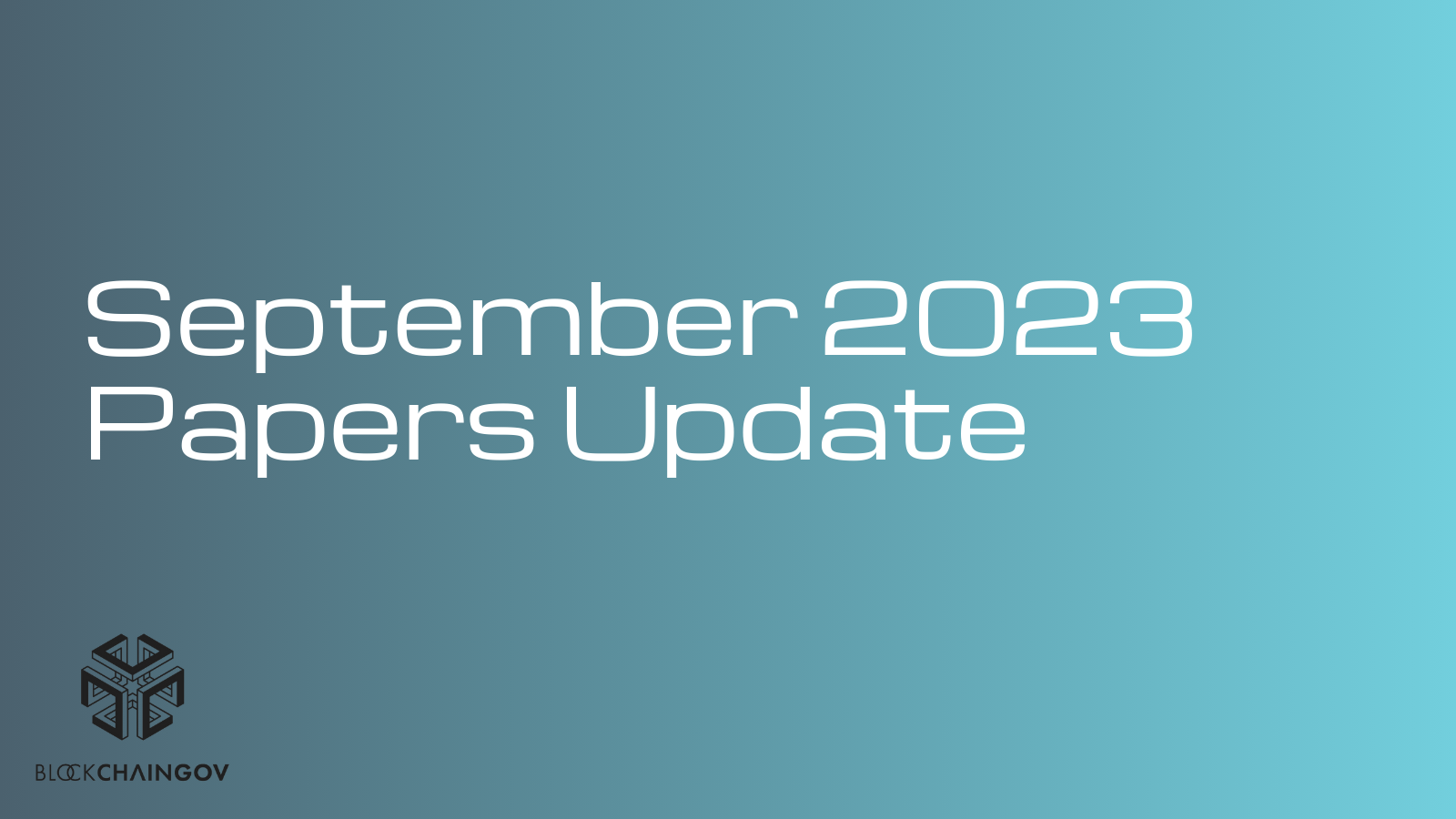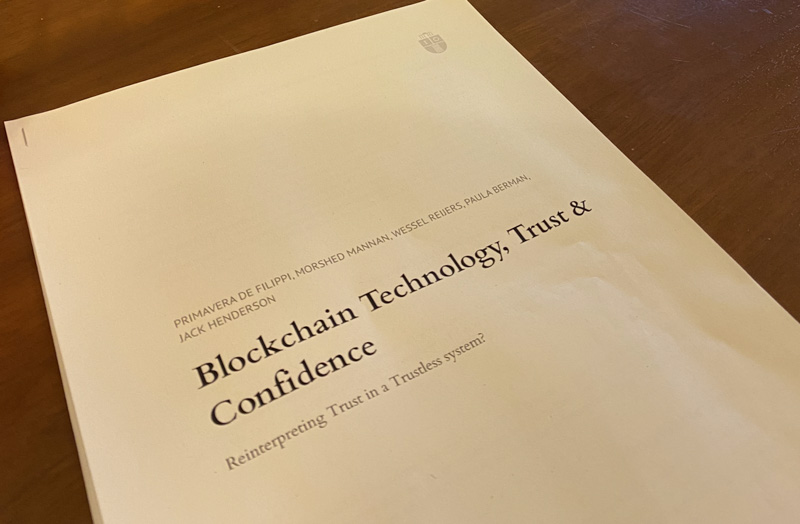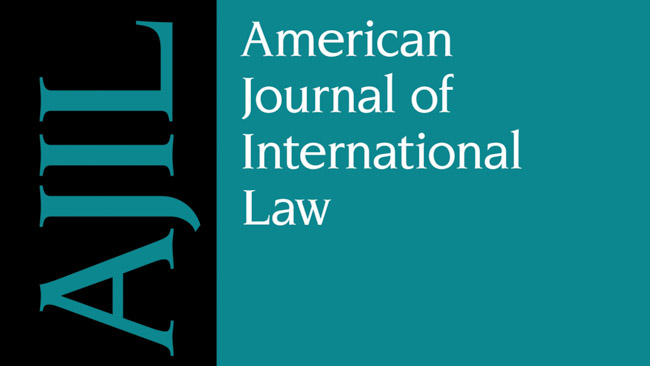COMMUNICATIONS
 Articles, News, PublicationsBlockchainGov Scientific Publications 2024Scientific Publications 2024
Our team has worked on extensive academic research throughout the year, including ethnographic research on DAOs, governance disputes, AI system dissection, and more. Here is a complete list of all of BlockhainGov Scientific Publications in 2024:
Mannan, M. & Pek, S. (2024) “Platform Cooperatives and the Dilemmas of Labor-Member Participation”, in New Technology, Work and Employment, Vol. 39, No. 2, pp. 219-237, https://doi.org/10.1111/ntwe.12273.
Mannan, M. & Pek, S. (2024). “The Shadow of Digital Feudalism in the Distributed Metaverse”, submitted to Business & Society.
Mannan, M. (2024) Blockchain Lawyering (first draft submitted to IGLP GSA 2024 in South Africa)
Nabben, K. & De Filippi, P. (2024) Accountability Protocols? On-chain Dynamics in Blockchain Governance, Internet Policy Review. Volume 13, Issue 4
Werbach, K, De Filippi, P., Tan, J., Pieters, G. (2024) “Blockchain Governance in the Wild”, Crypto-Economic Systems, Vol. 3, Issue 1. MIT Digital Currency Initiative.
Mannan, M. & Pek, S. (2024) “The Regulation of Digital Labour Platforms: Broadening our Understanding by Embracing a Plurality of Organizational Archetypes” (to be submitted to Policy & Internet).
Kamalova J. “Exploring Blockchain-Based Alternative Dispute Resolution: Limitations of Traditional Methods and Prospects for Further Research” (2024) Harvard Negotiation Law Review, Forthcoming
Bodo, B. & De Filippi, P. (2024) “Trust in Context : The impact of regulation on blockchain and DeFi”, Special Issue on The Impact of Emerging Technologies on Trust and Governance, in Regulation and Governance.
Mannan, M. (2024) “From Digital Humanitarianism to Crypto-Humanitarianism”, International Trade and Business Law Review, Vol. 24, pp. 121-148.
Merk, T. (2024) “The unusual DAO: an ethnography of building trust in ‘trustless’ spaces” (under revision at Internet Policy Review)
Alston, E., & Cossar, S. (2024) “Encryption as Privacy” (submitted in SSRN, for submission at the Cambridge Law and Institutional Economics journal).
Merk, T. (2024) “Why to DAO? A narrative analysis of the drivers of tokenized Exit to Community” in Proceedings of the European DAO Workshop, https://doi.org/10.48550/arXiv.2407.14327. [...]
January 6, 2025
Articles, News, PublicationsBlockchainGov Scientific Publications 2024Scientific Publications 2024
Our team has worked on extensive academic research throughout the year, including ethnographic research on DAOs, governance disputes, AI system dissection, and more. Here is a complete list of all of BlockhainGov Scientific Publications in 2024:
Mannan, M. & Pek, S. (2024) “Platform Cooperatives and the Dilemmas of Labor-Member Participation”, in New Technology, Work and Employment, Vol. 39, No. 2, pp. 219-237, https://doi.org/10.1111/ntwe.12273.
Mannan, M. & Pek, S. (2024). “The Shadow of Digital Feudalism in the Distributed Metaverse”, submitted to Business & Society.
Mannan, M. (2024) Blockchain Lawyering (first draft submitted to IGLP GSA 2024 in South Africa)
Nabben, K. & De Filippi, P. (2024) Accountability Protocols? On-chain Dynamics in Blockchain Governance, Internet Policy Review. Volume 13, Issue 4
Werbach, K, De Filippi, P., Tan, J., Pieters, G. (2024) “Blockchain Governance in the Wild”, Crypto-Economic Systems, Vol. 3, Issue 1. MIT Digital Currency Initiative.
Mannan, M. & Pek, S. (2024) “The Regulation of Digital Labour Platforms: Broadening our Understanding by Embracing a Plurality of Organizational Archetypes” (to be submitted to Policy & Internet).
Kamalova J. “Exploring Blockchain-Based Alternative Dispute Resolution: Limitations of Traditional Methods and Prospects for Further Research” (2024) Harvard Negotiation Law Review, Forthcoming
Bodo, B. & De Filippi, P. (2024) “Trust in Context : The impact of regulation on blockchain and DeFi”, Special Issue on The Impact of Emerging Technologies on Trust and Governance, in Regulation and Governance.
Mannan, M. (2024) “From Digital Humanitarianism to Crypto-Humanitarianism”, International Trade and Business Law Review, Vol. 24, pp. 121-148.
Merk, T. (2024) “The unusual DAO: an ethnography of building trust in ‘trustless’ spaces” (under revision at Internet Policy Review)
Alston, E., & Cossar, S. (2024) “Encryption as Privacy” (submitted in SSRN, for submission at the Cambridge Law and Institutional Economics journal).
Merk, T. (2024) “Why to DAO? A narrative analysis of the drivers of tokenized Exit to Community” in Proceedings of the European DAO Workshop, https://doi.org/10.48550/arXiv.2407.14327. [...]
January 6, 2025 Articles, Polycentrism, PublicationsAdaptive Governance for Blockchain NetworksAdaptive Governance for Blockchain Networks
Esen Esener
This research investigates adaptive governance for blockchain networks within the context of legal resilience by looking at the current regulatory trends in two major jurisdictions, the European Union and the United States. The paper explores the current stance of blockchain networks and regulations, and explains why alegality of blockchain networks is no longer a justifiable argument. It also finds that the current regulatory environment is not suitable for blockchain network compliance due to their properties, presenting an existential threat and fear of legal claims which may lead to full banning, criminal charges or a loss of user base. In order to address the threat, this research suggests that blockchain networks should develop legal resilience within their governance mechanisms. Later, the research investigates the theory of adaptive governance for the purpose of assessing its applicability to blockchain networks with the aim of helping them adapt to regulatory changes while staying decentralized. Lastly the paper makes seven recommendations to blockchain networks to consider for their governance and policies. [...]
January 8, 2024
Articles, Polycentrism, PublicationsAdaptive Governance for Blockchain NetworksAdaptive Governance for Blockchain Networks
Esen Esener
This research investigates adaptive governance for blockchain networks within the context of legal resilience by looking at the current regulatory trends in two major jurisdictions, the European Union and the United States. The paper explores the current stance of blockchain networks and regulations, and explains why alegality of blockchain networks is no longer a justifiable argument. It also finds that the current regulatory environment is not suitable for blockchain network compliance due to their properties, presenting an existential threat and fear of legal claims which may lead to full banning, criminal charges or a loss of user base. In order to address the threat, this research suggests that blockchain networks should develop legal resilience within their governance mechanisms. Later, the research investigates the theory of adaptive governance for the purpose of assessing its applicability to blockchain networks with the aim of helping them adapt to regulatory changes while staying decentralized. Lastly the paper makes seven recommendations to blockchain networks to consider for their governance and policies. [...]
January 8, 2024 Articles, Books, News, PublicationsSeptember 2023 Papers UpdateSeptember 2023 Papers Update
Our team has been keeping busy with a variety of research projects, focus groups, and initiatives, analyzing from different perspectives the evolution of the blockchain space!
It’s been a while since we last updated our website with these exciting developments, so we wanted to share some of the latest happenings with you. Here you can find the list of our most recent papers and book chapters.
Papers
Von Blomberg, M., Reijers, W. (2023) “Who Deserves Credit? Banks for the Virtuous in Rural China” in Journal of Contemporary China. Taylor & Francis.
Bühler, M.M.; Calzada, I.; Cane, I.; Jelinek, T.; Kapoor, A.; Mannan, M.; Mehta, S.; Mookerje, V.; Nübel, K.; Pentland, A.; Scholz, T.; Siddharth, D.; Tait, J.; Vaitla, B.; Zhu, J. (2023) “Unlocking the Power of Digital Commons: Data Cooperatives as a Pathway for Data Sovereign, Innovative and Equitable Digital Communities”. Digital 2023, 3, 146–171. https://doi.org/10.3390/digital3030011
Merk, T., Tan, J., Hubbard, S., Oak, E. (2023) “Open Problems in DAOs”, website publication (and under process for submission)
De Filippi, P., Santolini, M. (2023) “Extitutional Theory: Modeling Structured Social Dynamics Beyond Institutions” in Ephemera: Theory in Politics and Organisation
Mannan, M., Pek, S. & Scholz, T. (2023) “Platform Cooperatives and Poverty Eradication: Building on the Legacy of Johnston Birchall”, in Journal of Entrepreneurial & Organizational Diversity (accepted, forthcoming)
Mannan, M. & Pek, S. (2023) “Platform Cooperatives and the Dilemmas of Labor-Member Participation”, in New Technology, Work and Employment. https://doi.org/10.1111/ntwe.12273.
De Filippi, P., Enguehard, C., Fayon, D., Gagnebien, A., Vidal, G. (2023) “Quelques enjeux de sécurité, juridiques, économiques, et énergétiques des blockchains” in Terminal. https://doi.org/10.4000/terminal.8995
Special Issues
De Filippi, P., Enguehard C., Fayon D., Gagnebien A., Vidal G. (eds) (2023) special edition on “Blockchains : enjeux de sécurité, juridiques, économiques, et coûts énergétiques” for Terminal. [...]
September 11, 2023
Articles, Books, News, PublicationsSeptember 2023 Papers UpdateSeptember 2023 Papers Update
Our team has been keeping busy with a variety of research projects, focus groups, and initiatives, analyzing from different perspectives the evolution of the blockchain space!
It’s been a while since we last updated our website with these exciting developments, so we wanted to share some of the latest happenings with you. Here you can find the list of our most recent papers and book chapters.
Papers
Von Blomberg, M., Reijers, W. (2023) “Who Deserves Credit? Banks for the Virtuous in Rural China” in Journal of Contemporary China. Taylor & Francis.
Bühler, M.M.; Calzada, I.; Cane, I.; Jelinek, T.; Kapoor, A.; Mannan, M.; Mehta, S.; Mookerje, V.; Nübel, K.; Pentland, A.; Scholz, T.; Siddharth, D.; Tait, J.; Vaitla, B.; Zhu, J. (2023) “Unlocking the Power of Digital Commons: Data Cooperatives as a Pathway for Data Sovereign, Innovative and Equitable Digital Communities”. Digital 2023, 3, 146–171. https://doi.org/10.3390/digital3030011
Merk, T., Tan, J., Hubbard, S., Oak, E. (2023) “Open Problems in DAOs”, website publication (and under process for submission)
De Filippi, P., Santolini, M. (2023) “Extitutional Theory: Modeling Structured Social Dynamics Beyond Institutions” in Ephemera: Theory in Politics and Organisation
Mannan, M., Pek, S. & Scholz, T. (2023) “Platform Cooperatives and Poverty Eradication: Building on the Legacy of Johnston Birchall”, in Journal of Entrepreneurial & Organizational Diversity (accepted, forthcoming)
Mannan, M. & Pek, S. (2023) “Platform Cooperatives and the Dilemmas of Labor-Member Participation”, in New Technology, Work and Employment. https://doi.org/10.1111/ntwe.12273.
De Filippi, P., Enguehard, C., Fayon, D., Gagnebien, A., Vidal, G. (2023) “Quelques enjeux de sécurité, juridiques, économiques, et énergétiques des blockchains” in Terminal. https://doi.org/10.4000/terminal.8995
Special Issues
De Filippi, P., Enguehard C., Fayon D., Gagnebien A., Vidal G. (eds) (2023) special edition on “Blockchains : enjeux de sécurité, juridiques, économiques, et coûts énergétiques” for Terminal. [...]
September 11, 2023 Articles, Books, News, Publications, ReportsNew Academic Papers Alert!New
Academic Papers
Alert !
De Filippi, P, Mannan, M. presentation of “The BlockchainGov Report on Trust and Confidence in Blockchain Technology”, in the framework of the EUI Tech Cluster research seminar series. European University Institute. 18 May 2022. Florence. Italy
Our team is involved in a variety of research projects, focus groups and initiatives that aim to explore challenges of the blockchain technology.
Here are some of the recently published selected papers authored by our members, advisors and affiliates:
1. De Filippi, P., Poux, P., Deffains, B. (2022) “MEV ou la tragédie des blockchains en tant que communs, in Terminal. (forthcoming)
2. Rennie, E., Zargham, M., Tan, J., Miller, L., Abbott, J., Nabben, K., De Filippi, P. (2022) “Towards a participatory digital ethnography of blockchain governance.”
3. Reijers, W., Orgad, L., De Filippi, P. (2022) “The Rise of Cybernetic Citizenship” in Citizenship Studies, Special Issue on “Digital Citizenship in the Post-Pandemic Urban Realm.
4. De Filippi, P., Mannan, M., Reijers, W. (2022) “The Alegality of Blockchain Technology”, in Policy & Society, special issue: “The Policy Dilemmas of Blockchain”.
5. De Filippi, P., Leiter, A. (2021) “Blockchain in Outer Space” in American Journal of International Law (AJIL) Unbound, special issue: “The Global Governance Implications of Blockchain”
[...]
August 6, 2022
Articles, Books, News, Publications, ReportsNew Academic Papers Alert!New
Academic Papers
Alert !
De Filippi, P, Mannan, M. presentation of “The BlockchainGov Report on Trust and Confidence in Blockchain Technology”, in the framework of the EUI Tech Cluster research seminar series. European University Institute. 18 May 2022. Florence. Italy
Our team is involved in a variety of research projects, focus groups and initiatives that aim to explore challenges of the blockchain technology.
Here are some of the recently published selected papers authored by our members, advisors and affiliates:
1. De Filippi, P., Poux, P., Deffains, B. (2022) “MEV ou la tragédie des blockchains en tant que communs, in Terminal. (forthcoming)
2. Rennie, E., Zargham, M., Tan, J., Miller, L., Abbott, J., Nabben, K., De Filippi, P. (2022) “Towards a participatory digital ethnography of blockchain governance.”
3. Reijers, W., Orgad, L., De Filippi, P. (2022) “The Rise of Cybernetic Citizenship” in Citizenship Studies, Special Issue on “Digital Citizenship in the Post-Pandemic Urban Realm.
4. De Filippi, P., Mannan, M., Reijers, W. (2022) “The Alegality of Blockchain Technology”, in Policy & Society, special issue: “The Policy Dilemmas of Blockchain”.
5. De Filippi, P., Leiter, A. (2021) “Blockchain in Outer Space” in American Journal of International Law (AJIL) Unbound, special issue: “The Global Governance Implications of Blockchain”
[...]
August 6, 2022Articles, PublicationsThe Alegality of Blockchain TechnologyDe Filippi, P., Mannan, M., Reijers, W. (2021) “The Alegality of Blockchain Technology”, in Policy & Society, special issue: “The Policy Dilemmas of Blockchain” (forthcoming) [...]
November 15, 2021 Articles, PublicationsBlockchain in Outer SpaceDe Filippi, P., Leiter, A. (2021) “Blockchain in Outer Space” in American Journal of International Law (AJIL) Unbound, special issue: “The Global Governance Implications of Blockchain”
Extract
“Blockchain technology has spurred the emergence of powerful narratives to promote new ways of governing outer space. The list of proposed uses for blockchain applications in outer space is endless—from property registries for asteroid mining, to supply chain management systems, or interplanetary cryptocurrencies for the space economy—along with Elon Musk claiming that “SpaceX is going to put a literal Dogecoin on the literal moon.” Yet, thus far, none of these projects have gone beyond simple declarations or white papers, mostly due to the inherent limitations on the effective enforcement of blockchain-based rules outside of their own technical framework. In this essay, we argue that blockchain technology is relevant for outer space because it fosters novel narratives advancing possible futures characterized by new modes of governance. The strongest and most prominent of these narratives is the crypto-libertarian one, which draws heavily on the absence of a state, the sanctity of property, and the primacy of private ordering through decentralized markets. But there are other narratives proposed by relevant actors in the blockchain space that are dedicated to other modes of governance. By focusing on alternative narratives for blockchain technology, we illustrate how the possible applications of blockchain technology in outer space may extend beyond the current libertarian dreams, to support a more commons-based approach to outer space governance.”
Read the following here. [...]
November 15, 2021
Articles, PublicationsBlockchain in Outer SpaceDe Filippi, P., Leiter, A. (2021) “Blockchain in Outer Space” in American Journal of International Law (AJIL) Unbound, special issue: “The Global Governance Implications of Blockchain”
Extract
“Blockchain technology has spurred the emergence of powerful narratives to promote new ways of governing outer space. The list of proposed uses for blockchain applications in outer space is endless—from property registries for asteroid mining, to supply chain management systems, or interplanetary cryptocurrencies for the space economy—along with Elon Musk claiming that “SpaceX is going to put a literal Dogecoin on the literal moon.” Yet, thus far, none of these projects have gone beyond simple declarations or white papers, mostly due to the inherent limitations on the effective enforcement of blockchain-based rules outside of their own technical framework. In this essay, we argue that blockchain technology is relevant for outer space because it fosters novel narratives advancing possible futures characterized by new modes of governance. The strongest and most prominent of these narratives is the crypto-libertarian one, which draws heavily on the absence of a state, the sanctity of property, and the primacy of private ordering through decentralized markets. But there are other narratives proposed by relevant actors in the blockchain space that are dedicated to other modes of governance. By focusing on alternative narratives for blockchain technology, we illustrate how the possible applications of blockchain technology in outer space may extend beyond the current libertarian dreams, to support a more commons-based approach to outer space governance.”
Read the following here. [...]
November 15, 2021Articles, PublicationsExtitutional Theory: Modeling Structured Social Dynamics Beyond InstitutionsDe Filippi, P., Santolini, M. (2021) “Extitutional Theory: Modeling Structured Social Dynamics Beyond Institutions” in Ephemera: Theory in Politics and Organisation (forthcoming). [...]
November 15, 2021
















 This site is licensed under a Creative Commons Attribution 4.0 International License. The BlockchainGov project has been funded by an European Research Council Grant.
This site is licensed under a Creative Commons Attribution 4.0 International License. The BlockchainGov project has been funded by an European Research Council Grant.